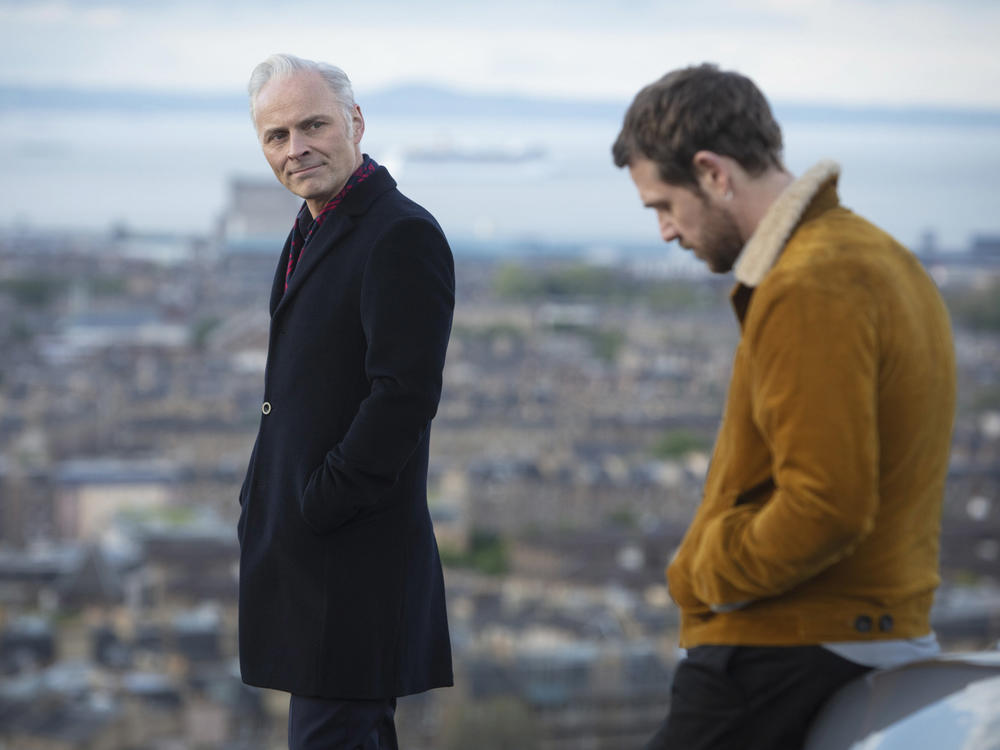Section Branding
Header Content
There's Plenty Of 'Guilt' To Go Around In This Scottish Hit-And-Run Thriller
Primary Content
Ever since Watergate, it's become commonplace to say that it's not the crime but the cover-up that takes you down. While this may be true of political or financial malfeasance, sometimes a crime is so grievous that covering it up might seem to be the smart move.
That's the move that gets made in Guilt, a darkly comic Scottish thriller about two Edinburgh brothers who do a bad thing then scramble to avoid the consequences. The latest offering of PBS's Masterpiece, this four-part series has a verve that made me think of the TV series Fargo, which I mean as high praise. Supercharged by a live-wire performance by star Mark Bonnar, this show starts breezy — and then deepens.
Guilt begins with sleek Max McCall (played by Bonnar) and his shambly younger brother, Jake, driving drunkenly home after a wedding. On a deserted residential street, they hit an old man and kill him.
Guileless Jake wants to call the cops, but overbearing Max is a high-powered lawyer who insists that turning themselves in will ruin them. And so they drag the dead man back to his home and try to make it look like he died of natural causes.
At first, luck is on their side. It turns out the old man was dying of pancreatic cancer and the authorities assume that's what killed him. Then the victim's American niece, Angie — nicely played by Ruth Bradley — turns up for the funeral and begins asking questions. Before the brothers know it, they're dealing with a drunken detective, an old woman across the street whose deadpan demeanor hides all manner of invisible wiles, and a gangster played by the wonderful Scottish actor Bill Paterson (who's been in everything from The Singing Detective to Fleabag).
As if that weren't enough, Jake and Angie fall for each other — they bond over naming the best Bowie record — while Max's wife, Claire, who feels trapped in their glossy, soulless house, is being wooed by a woman at the gym. Max keeps telling Jake that everything is under control, but every time they think they're safe, a new witness or clue appears. The show practically echoes with the sounds of other shoes dropping — and it doesn't help that neither brother trusts the other.
Now, you may want to put on the subtitles when you watch Guilt — the accents are as richly Scottish as a deep-fried Mars Bar. But don't let that put you off. This is a program that grabs you. The tension never lets up, and yet it possesses a core of human feeling, starting with the warped relationship between the brothers.
A failed rock musician who now runs a floundering used record store, Jake is a sympathetic forest creature of a man — he's even bearded and shaggy — and he feels bad about their fatal hit-and-run. Warmly played by Jamie Sives, he's an essentially decent guy who becomes less eager to turn himself in when he falls for Angie and he finally has something to lose.
Even as we root for Jake, Bonnar's bravura as the hubristic, cold-blooded Max makes us yearn for his comeuppance. This pale, white-haired lawyer — with his gimlet eyes, vicious teeth and smug smile — resembles some sort of deep-sea barracuda that's been bleached from living so long with no light. Rivetingly awful and increasingly frantic, Max is the kind who, when he assures you that everything is fine, you better start looking for the exits.
Guilt is an apt title for the show, which offers colliding versions of what the word means. For Jake, guilt is personal — something you feel when you do something you know is wrong. For Max, it's a legal notion with no morality or emotion attached — if you get away with it, you're not guilty. In between, you find the show's other characters who, to different degrees, are all doing things they feel they shouldn't really be doing. There's plenty of guilt to go around.
Of course, in life there always is. As the late Ohio humorist Erma Bombeck famously said, guilt is the gift that keeps on giving.
Copyright 2021 Fresh Air. To see more, visit Fresh Air.

